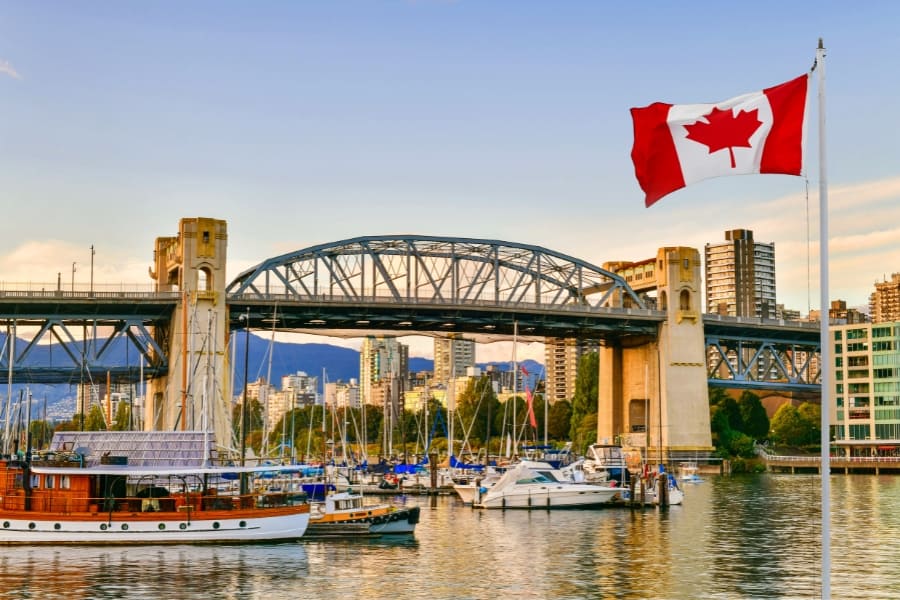Canada Travel Guide
Written by Joeri Van Overloop
Why Visit Canada?
If you're looking for a spectacular destination to explore, look no further than Canada. Whether it's outdoor adventure or cultural experiences that you seek, Canada offers something for everyone. This Canada travel guide will provide insight into the wonders of this amazing country and all the reasons why visiting is a must-do experience. With its picture perfect landscapes, vibrant cities, and friendly locals - there's no shortage of things to do and see in Canada.
Natural Beauty: Canada boasts a diverse range of breathtaking landscapes, from the Rocky Mountains to the pristine lakes of Ontario and the rugged coastline of British Columbia.
Wildlife: Canada is home to a variety of wildlife, including moose, black bears, and orcas, making it a top destination for animal lovers.
Outdoor Activities: From skiing and snowboarding in Canada during the winter to hiking and fishing in the summer, Canada offers a wide range of outdoor activities for adventure seekers.
Multiculturalism: Canada is a melting pot of cultures, with vibrant neighborhoods and diverse communities reflecting its multicultural heritage.
Food and drink: Canada is renowned for its cuisine, including its seafood, game, and local specialties like poutine and maple syrup.
Festivals and Events: Canada hosts numerous festivals and events throughout the year, from the Montreal Jazz Festival to the Calgary Stampede.
History and Heritage: Canada has a rich history and cultural heritage, with historic sites and museums showcasing the country's Indigenous and colonial past.
Friendly People: Canadians are known for their friendly and welcoming nature, making it a great destination for travelers who want to experience a warm and hospitable culture.
In summary, Canada offers a perfect blend of natural beauty, rich culture, delicious food, and amazing wildlife. From the picturesque mountains to the historic cities and beautiful Canadian lakes, Canada has something on offer for everyone. Whether you're looking for outdoor activities, a cultural experience, or an adventure, Canada is a great destination to spend your next vacation.
Frequently Asked Questions When Travelling To Canada
What Is A Good Budget For A Trip To Canada?
The cost of a trip to Canada can vary widely depending on your travel style, duration of the trip, and the time of year you visit Canada. However, a rough estimate for a budget-friendly trip to Canada would be around $50 to $150 per day per person. This budget would cover accommodations in budget-friendly options such as hostels or budget hotels, basic meals, and local transportation.
If you want to splurge on activities, dining, and attractions, you should expect to spend more, and a budget of around $200 to $300 per day per person would be more realistic. Keep in mind that prices in cities like Toronto and Vancouver can be significantly higher, and the cost of travel to remote destinations, such as the Canadian Arctic, can also be significantly higher.
Accommodation: On average, a budget-friendly option such as a hostel can cost around $30 to $50 per night, while a mid-range hotel can cost around $100 to $150 per night. If you are looking for luxury accommodations, such as a high-end hotel or a Canadian resort, you can expect to pay upwards of $200 per night or more.
Food and drink: The cost of eating out in Canada varies depending on the type of restaurant and location. On average, a budget meal at a fast food restaurant can cost around $10 to $15, while a mid-range meal at a sit-down restaurant can cost around $20 to $30. If you want to dine at a high-end restaurant, you can expect to pay upwards of $50 or more per person. It's also worth noting that taxes and gratuities are typically not included in the listed prices, so be prepared to add an additional 15% to 20% to your bill for these expenses.
Transportation: The cost of public transportation in Canada varies depending on the city and type of transportation. On average, a one-way ticket for local bus or subway can cost around $2.50 to $5, while a one-way ticket for regional trains or buses can cost around $10 to $20. It's also worth noting that many cities in Canada offer day or weekly passes, which can provide a better value for frequent travelers.
Activities and Excursions: The cost of activities and excursions in Canada can vary greatly depending on the specific activity or excursion, location, time of year, and other factors. For example, a guided hike in a Canadian national park may cost around $50-$100 per person, while a whale watching tour in British Columbia can cost upwards of $200 per person. Some popular tourist attractions, such as the CN Tower in Toronto or the Montreal Botanical Garden, have admission fees that range from $20 to $40.
It is important to keep in mind that this is a rough estimate and your actual budget may vary depending on your preferences and travel style.
How Many Days In Canada Is Enough?
The number of days needed for a vacation in Canada depends on a variety of factors, including the traveler's interests, your budget, and schedule. A general rule of thumb is to plan for at least a week in order to get a good sense of a destination and see some of its highlights.
If you want to visit multiple Canadian cities or regions, you may want to consider two weeks or more. For example, if you plan to explore both the Rocky Mountains and cities like Vancouver and Toronto, a two-week trip might be a good idea.
If you're on a tighter schedule or budget, a long weekend or a few days in a single city can still offer a glimpse of Canada's diverse landscapes and culture. Ultimately, the length of your trip will depend on what you want to see and experience in Canada.
What Is The Best Way To Tour Canada?

The best way of transportation to explore Canada depends on your personal preferences and travel style. However, here are a few popular options to consider:
Self-driving: Canada has a well-developed road network, and renting a car or an RV is a great way to see the country at your own pace. This allows you to take in the beautiful landscapes, visit small towns and villages, and explore the countryside.
Train travel: Canada also has an efficient train system that connects the main cities and towns. Travelling by train is a great way to see the country, especially if you're interested in visiting several cities. This option is also convenient if you want to avoid the hassle of driving and parking in crowded cities.
Guided tours: Guided tours are a great option for those who want a more structured and hassle-free way of seeing Canada. They take care of all the logistics, and you'll have a local guide who can provide insights and information about the places you're visiting in Canada.
Public transportation: Canada has a well-connected public transportation system within most cities, including buses and metro. This option is ideal for travelers on a budget, as it is relatively cheap, and also allows you to get a feel for the local way of life.
Ultimately, the best way to travel around Canada depends on your interests and priorities. A combination of these options could be a great way to explore different regions and aspects of the country, and get the most out of your trip to Canada.
What Is The Best Time To Visit Canada?
The best time to visit Canada varies depending on personal preference and the specific location in Canada you want to visit. Generally, the summer months of June to August are the warmest and offer the longest daylight hours, making it a popular time for outdoor activities and festivals. However, this is also the peak tourist season and can be more crowded.
Winter (December to February) is a great time to enjoy winter sports, but temperatures can be very low.
The spring (March to May) and fall (September to November) are usually milder and offer less crowds and colorful foliage in some regions.
In conclusion, the best time of year to visit Canada depends on your interests. If you're looking for warm weather, then ofcourse summer is the best option, if you want to avoid the crowds and enjoy milder temperatures and cheaper prices, spring or fall would be ideal. If you want to experience local festivals and events, consider visiting during the appropriate months when these events occur.
What Are The Dos And Don’ts In Canada?

Here are some dos and don'ts to keep in mind while visiting Canada:
Do's:
- Respect Canadian laws and customs, including their diverse cultural heritage and languages.
- Be polite and courteous to others.
- Be aware of and follow safety regulations, especially in outdoor activities.
- Respect nature and wildlife by following national park and wilderness area rules.
- Bring your passport or other acceptable identification when crossing the border into Canada.
Don'ts:
- Do not engage in illegal activities, including drug use.
- Do not carry or use firearms unless you have proper authorization.
- Do not damage public property or wildlife.
- Do not litter or pollute the environment.
- Do not engage in hate speech or discriminatory behavior.
By following these simple guidelines, you will be able to fully enjoy your visit to Canada and have a memorable experience while respecting the culture and customs of the country.
What Are The Visa Requirements For Canada?
The visa requirements for Canada vary depending on your country of origin, the purpose of your visit, and the length of your stay. Here are some general categories:
- Tourist visa: Most visitors to Canada require a visitor visa, also known as a Temporary Resident Visa (TRV). This visa allows you to stay in Canada for up to six months.
- Work visa: If you are coming to Canada to work, you will need a work permit in addition to a TRV. The type of work permit you need depends on the nature of your job and your country of origin.
- Study visa: If you are coming to Canada to study, you will need a study permit in addition to a TRV.
- Permanent Residency visa: If you want to immigrate to Canada on a permanent basis, you will need to apply for Permanent Residency.
You can find more information and determine if you need a visa by visiting the Government of Canada's immigration website at: https://www.canada.ca/en/immigration-refugees-citizenship/services/visit-canada.html.
Do I Need Travel Insurance To Visit Canada?
While travel insurance is not mandatory to visit Canada, it is highly recommended. Travel insurance can provide financial protection in case of unexpected events such as trip cancellation, medical emergencies, theft, or loss of luggage. It can also provide peace of mind and allow you to enjoy your trip to Canada without worrying about potential risks or costs.
If you have a comprehensive travel insurance policy, you may be covered for medical expenses, trip cancellations, and other unexpected events. It's a good idea to review your policy carefully before your trip to understand what is and is not covered, and to make sure you have adequate coverage.
Keep in mind that public health insurance plans in Canada may not cover all medical expenses for visitors, so it is important to have travel insurance to cover these costs if necessary.
How To Travel And Stay Safe In Canada?
Canada is generally considered a safe place to travel. The country has a low crime rate and a stable political environment, making it a popular destination for tourists. However, as with any destination, it's always a good idea to take common-sense precautions to stay safe and secure while traveling.
This includes being aware of your surroundings, keeping your valuables secure, and avoiding walking alone in unfamiliar or high-risk areas late at night. It's also a good idea to inform someone of your itinerary and keep a copy of your passport and other important documents in a safe place.
Overall, with proper planning and awareness, most travelers have a safe and enjoyable trip to Canada.
Where To Stay In Canada?
The Best Booking Resources For Canada
These are the companies I use predominantly when I travel. They offer great customer service and the best value, consistently outperform their competitors, as they always have excellent deals. I rely on them the most, and they are the starting point in my search for travel deals.
Booking.com - This is the best travel partner when it comes to planning your vacation in Canada. With over 28 million listings in more than 200 countries and territories, you'll have no problem choosing from the world's most comprehensive selection of accommodations - from exotic villas to cozy apartments! Booking.com offers a secure and convenient way to book your next holiday, with unbeatable deals that will make sure you get the best value for your money when travelling to Canada.
Skyscanner - This is the perfect tool for finding the best flights at the best prices to Canada. With a comprehensive selection of airlines to choose from, you can compare prices and routes in seconds - saving you time, stress and money. Skyscanner's intuitive search engine makes it easy to find great deals on domestic and international flights. Plus, you can easily customize your search preferences so you get results that fit your budget and destination needs.
Get Your Guide - Are you looking for ways to make your travel experiences more memorable? With GetYourGuide, you can book amazing activities, tours and attractions all over Canada. Whether it’s a tour of an iconic city landmark or unique experience that’s off the beaten path, GetYourGuide offers something spectacular for any traveler. With thousands of things to do and see in different cities around Canada, this platform simplifies the search process with user-friendly filters.


